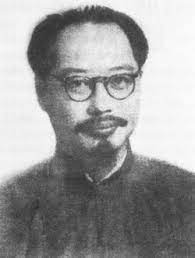Hsü Ti-shan (1893-4 August 1941), a founding member of the Literary Research Society and a noted writer of short stories, became the first professor of Chinese at the University of Hong Kong in 1936.
Tainan, Taiwan, was the birthplace of Hsü Ti-shan. His father, Hsü Nan-ying, was a native of Taiwan and a junior official at Tainan. He went to Fukien when Taiwan was ceded to the Japanese in 1895, and he later went to Singapore and Siam. He returned to China in 1902, when he was appointed magistrate of Hsuwen hsien in Kwangtung. A while later, he was transferred to Sanshui hsien, and in 1906 he resigned to make his home in Kwangtung. In 1911 the Hsü family moved to Fukien again, and Hsü Nan-ying became a middle school teacher. He went to Rangoon to teach in 1914 and to Sumatra in 1916, where he died in 1919. Because of these early travels Hsü Ti-shan grew up speaking Fukienese as well as Cantonese and Mandarin. While at middle school, he became closely associated with activities of the London Mission Society and was converted to Christianity. In 1918 he entered Yenching University in Peking. After receiving the B.A. degree in 1920, he entered the School of Religion and received the B.Div. degree in 1922. Hsü went to study abroad, first at Columbia University in New York, where he received an M.A. degree in 1925, the title of this thesis being "A Study of Certain Chinese Texts Relating to Manichaeism," and then to Oxford, where he received a B.A. After returning to China in 1926, he joined the Yenching University faculty as a professor of theology and history. In the years following," he also lectured at Tsinghua and Peking universities- and served as a member of the ministry of education's commission for the promotion of the unification of the national language.
In 1936 Hsü resigned from Yenching to go to Hong Kong, where the university was attempting to remedy the backward state of Chinese studies in its curriculum by creating a new chair of Chinese. The post was first offered to Hu Shih. He turned it down, but recommended Hsü Ti-shan. At first Hsü was reluctant to work in such a cultural backwater as colonial Hong Kong, but, after considerable discussion, he was persuaded to go. He remained in this post until his death and commanded a loyal following as a teacher.
Hsü Ti-shan had a wide range of scholarly interests. Literature was only one of his many activities, and he was as much an anthropologist as a writer. He did extensive research on comparative religion and was a specialist in Taoism and Buddhism. He was also a serious student of Sanskrit. He published frequent articles on Buddhism and Taoism in Chinese journals, and in 1934 the Commercial Press published the first volume of his Tao-chiao-shih [history of Chinese Taoism], which, unfortunately, he never completed. He also compiled the Combined Indices to the Authors and Titles of Books and Chapters in Four Collections of Buddhistic Literature (Harvard-Yenching Sinological Index Series, 1933), an invaluable research tool for all scholars of Chinese Buddhism. During his years in Hong Kong, Hsü also published a series of articles in the Ta Kung Pao on the history of Chinese women's costume.
It was as a writer, however, that Hsü claimed his place in the history of republican China. When he was still a student at Yenching, he became prominent in contemporary literary developments. He was one of the 12 sponsors elected to the Literary Association, set up under Cheng Chen-to's direction on 29 November 1920. After the inauguration of the society in January 1921, Hsü became a regular contributor to Hsiao-shuo yueh-pao [the short story]. Most of his writings were published under the pseudonym Lo-hua-sheng. Hsü's early tales were romantic and showed the influence of both Buddhist stories and Christian legends. In 1925 he published his first collection of stories undfr the title Chiu-wang lao-chu [the vain labours of a spider]. In 1928 a second collection, IVufa-t'ou ti yu-chien [letters that could not be sent anywhere], was published. Both collections show Hsü's basic concern with religious love and charity and his attempt to recover spiritual values for his time. His plots are complicated, and many of his characters are conceived allegorically. This is most noticeable in "Yü kuan," in which disinterested goodness as a touchstone for conduct is explored through the experiences of a Chinese Christian convert, Yü-kuan. Unlike much of the fiction of the time, which was preoccupied with ideology and propaganda, Hsü's story achieves the level of pure moral exploration. Alone of his contemporaries, and most perfectly in "Yü-kuan," Hsü argued for a spiritual, as opposed to a material and revolutionary, solution to the problems of life in China.
Hsü Ti-shan married twice. His first wife died very young after bearing him a daughter, Fan-hsin. In 1929 he married Chou Sun-sung, a graduate of Peking Normal College. They had a daughter, Yen-chi, and a son, Lin-ch'ung.

许地山
笔名:落华生
许地山(1893—1941.8.4),“文学研究会”创办人,短篇小说的名作家,香港大学的第一个中国籍教授。
许地山生在台湾台南,他父亲许南英在台南做过小官。1895年台湾割让给日本后,他们迁往福建,后来又去新加坡、暹罗,1902年回国。他父亲任广东徐闻县知县,不久调三水县,1906年退职后在广东落户。1911年又迁往福建,他父亲在一个中学当教师,1914年去仰光教书,1916年去苏门答腊教书,1919年死在苏门答腊。
许地山由于幼年走过许多地方,能说闽、粤方言和北方官话。他在中学时,与伦敦布道会的活动有密切联系进入了基督教。1918年到北京入燕京大学。1920年获得学士学位后,他又入神学院,1922年获得神学学士学位。以后,许地山出国留学,先在纽约哥伦比亚大学,1925年以《对有关摩尼教的中国典籍之研究》为题的论文获硕士学位,后又进牛津大学,获学士学位。1926年回国,在燕京任神学及历史学教授。翌年,兼在清华大学、北京大学讲学,又任教育部“国语统一筹备委员会”委员。
1936年,许地山辞去燕京教职到香港。当时香港大学为改进中文课程的落后状态、增设汉学研究的讲座,原聘请胡适,胡适未就,推荐了许地山。许地山本来是不愿意到这个文化上死气沉沉的殖民地香港去工作的,经过反复磋商,他才应允前去,担任此职直到去世。他在任教期间深受尊崇。
许地山在学术研究领域内有广泛的兴趣。文学不过是其中之一而已,他作为一位人类学家的成就不下于一名作家。他对比较宗教进行了渊博的研究,是研究道教、佛教的专家。他还是一位认真的梵语学者。他经常在中文期刊上发表有关道教、佛教的论文,1934年商务印书馆出版了他的《道教史》第一卷,但不幸未能写完。又编了《四种佛教文集的作者及篇目综合索引》,这是研究中国佛教的宝贵工具书。他在香港期间,还为《大公报》写了一些关于中国妇女服装史的连载文章。
不过,许地山还是以一名作家在民国历史上占有地位。当他还是燕京学生的时候,就在当代中国文学发展上享有盛名了。他是1920年11月29日由郑振铎创办的“文学研究会”的十二名发起人之一。1921年1月,该会正式成立后,许地山是《小说月报》经常的撰稿人,他的作品用笔名落华生发表。他早期的小说具有浪漫主义色彩,表现出曾受佛教、基督教传说的影响。1925年,出版了他第一部小说集《缀网劳蛛》,1928年出版了第二部小说集《无法投递之邮件》。这两本小说集都看出许带有宗教仁爱及慈悲的基本思想和恢复当代的精神作用的企图。他的创作情节是复杂的。他的小说中的许多人物都是用比喻手法来表现的。这在《玉官》中最为明显,在这篇作品里,通过一个中国基督教徒玉官的经历探讨了以无私的美德作为检验行为的标准。与当时一般充满意识形态和宣传的作品相比,他的小说达到了纯道德探索的水平。他的作品在当时独树一帜,以《玉官》最为典型,许地山反对物质及革命的手段,而主张以精神的办法来解决中国的人生问题。
许地山结婚两次。前妻在生他的女儿林新时早死。1929年与北京师范学院毕业生周生姗(音)结婚,生有女燕吉和子苓仲。